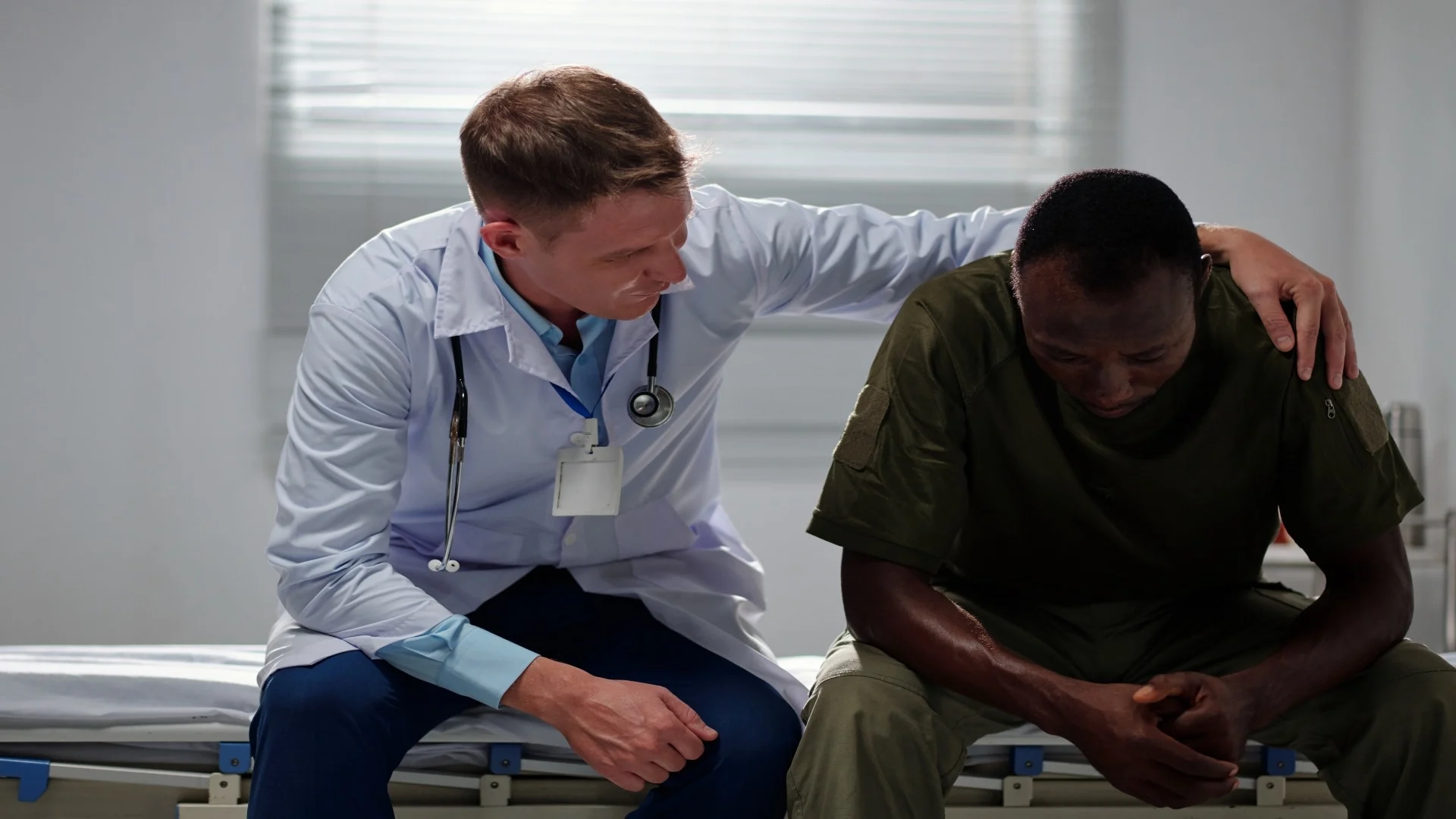Drug and Alcohol
Meth Detox

Meth detox is the first step toward breaking free from meth addiction. Learn what to expect, how it works, and why professional support makes a difference.
How long does meth detox typically last?
Meth detox usually begins within 24 hours after the last use. The most intense symptoms last about 7 to 10 days, but some effects—like cravings, fatigue, and emotional instability—can continue for weeks or even months, depending on the individual.
What withdrawal symptoms show up during meth detox?
Common symptoms of meth detox include fatigue, anxiety, increased appetite, insomnia, vivid dreams, irritability, and intense drug cravings. Some individuals may also experience depression, confusion, or paranoia as the brain adjusts to functioning without meth.
Are there medications for meth detox?
While no medications are approved explicitly for meth detox, doctors may use antidepressants, anti-anxiety drugs, or sleep aids to ease symptoms. Supportive care and therapeutic interventions also play a critical role in managing the detox process safely and effectively.
Can I detox from meth at home?
Detoxing from meth at home can be dangerous due to unpredictable psychological symptoms. A medically supervised meth detox ensures your safety, provides symptom relief, and connects you with professional support to reduce the risk of relapse during this vulnerable time.
What comes after meth detox?
Meth detox is just the first step in recovery. Continued care often includes therapy, relapse prevention, group counseling, and mental health support. Ongoing treatment helps address the root causes of addiction and supports long-term recovery and personal growth.
Struggling with meth addiction can leave you feeling trapped—physically drained, emotionally unstable, and unsure where to turn. The more the meth use continues, the more intense the damage becomes, making it harder to break free. The withdrawal symptoms alone can feel unbearable without the right help.
That’s why meth detox is such an essential first step. With proper support, you can begin this process safely and regain control of your life. If you or someone you love is ready to start over, meth detox offers a path toward healing, stability, and lasting recovery.
Why Professional Meth Detox Matters

Meth withdrawal can be more than just uncomfortable—it can be physically and emotionally dangerous.
While some people might believe they can quit on their own, doing so without medical supervision increases the risk of severe psychological symptoms such as paranoia, anxiety, suicidal thoughts, and deep depression.
The mental health toll can be overwhelming, especially when combined with sleep disturbances and intense cravings.
Why Medical Supervision Is Essential
At The Edge Treatment Center, we’ve seen firsthand how medical detox saves lives. A supervised environment allows us to monitor your health 24/7, provide targeted relief for distressing symptoms, and intervene quickly if any complications arise.
Moreover, it provides a safe and structured environment where you can initiate your recovery with stability and support.
Building a Strong Foundation for Long-Term Healing
Detox is the critical first step in a much longer journey. Completing detox in a professional setting increases the likelihood that you’ll continue with comprehensive treatment.
Without this foundation, many people relapse before they even begin proper recovery. Our program ensures that once detox is complete, you’re ready and supported to move forward.
What to Expect During Detox
The experience of meth detox varies from person to person, but there are some common stages that most individuals go through. Knowing what to expect can help reduce fear and prepare you for the journey ahead.
Phase 1: The Crash (First 24–72 Hours)
A dramatic decline in energy, mood, and mental clarity characterizes this initial stage. Many people experience fatigue, irritability, and emotional exhaustion, feeling overwhelmed.
Cravings for meth may be intense, and you might also experience anxiety or agitation. Sleep may increase significantly during this time as the body recovers from the illness's effects.
Phase 2: Acute Withdrawal (Days 3–10)
During this stage, psychological symptoms become more pronounced. You may experience insomnia or oversleeping, mood swings, difficulty focusing, depression, and loss of motivation.
Some individuals report feelings of hopelessness or paranoia. While physically this stage may feel less intense than the crash, it can be emotionally challenging.
Phase 3: Prolonged Symptoms (Weeks to Months)
After acute withdrawal, lingering symptoms can persist for weeks or even months. This includes emotional numbness, anxiety, and difficulty concentrating. Some individuals may experience post-acute withdrawal syndrome (PAWS), which includes unpredictable mood changes and low energy.
Our Support Through Every Stage
At The Edge Treatment Center, we walk with you through each of these stages. Our team continuously monitors your symptoms and tailors your care plan as needed to ensure optimal care and support. From the moment you enter detox, we provide reassurance, comfort, and expert care to make the process as manageable as possible.

We’re Here To Help You Find Your Way
Would you like more information about mental health or drug addiction? Reach out today.
Medical & Supportive Care Options

There’s no single solution that works for everyone going through meth detox. Each individual responds differently to withdrawal, which is why a tailored, person-centered approach is critical.
Since there are currently no FDA-approved medications explicitly designed for methamphetamine withdrawal, we focus on treating symptoms as they arise, restoring your physical health, and addressing your emotional and mental well-being at every step.
At The Edge Treatment Center, we believe in treating the whole person, not just the addiction. Our meth detox program combines medical interventions, nutritional care, emotional support, and constant monitoring to ensure that you’re comfortable, safe, and supported throughout the entire process.
Medication-Assisted Symptom Relief
Meth withdrawal can cause a wide range of intense symptoms, particularly in the early stages. While the detox process is largely symptom-based, certain medications can be used to reduce the severity of those symptoms and make the process more tolerable.
Our medical team may recommend:
Antidepressants or mood stabilizers to help regulate emotional imbalances like anxiety, depression, or irritability that often arise during detox. These medications help support your mood and mental clarity, especially if you’re struggling with underlying mental health conditions.
Sleep aids to address severe insomnia, which is a common and distressing symptom of meth withdrawal. Rest is essential for both physical healing and emotional resilience, and we ensure you get the sleep your body needs to recover.
Antipsychotic medications, used only in more extreme cases, can help if you experience hallucinations, paranoia, or delusional thinking during withdrawal. While these symptoms are less common, our team is prepared to respond immediately and safely if they occur.
Each medication is carefully selected based on your individual needs and administered in a closely monitored setting. We consistently reassess your condition to ensure medications are used appropriately and effectively.
Nutritional Support and Hydration
Meth use often depletes the body of essential nutrients and fluids. During detox, our goal is to restore balance through proper hydration and nutrition.
You’ll receive well-balanced meals designed to rebuild your strength and improve mental clarity. When necessary, supplements are provided to address any specific deficiencies.
Psychological and Emotional Support
Detox is not just a physical process—it profoundly impacts your emotions. We offer access to therapeutic support throughout detox, including:
Grounding techniques for anxiety and emotional regulation
Light introduction to counseling to ease the transition into complete treatment
This compassionate support makes a significant difference in how you feel during the most challenging parts of withdrawal.
Around-the-Clock Monitoring and Care
Safety is always our top priority. At The Edge Treatment Center, we offer 24/7 medical monitoring to manage symptoms as they arise and adjust your care plan in real-time. Whether you're experiencing physical discomfort or emotional distress, our team is ready to help.
How The Edge Treatment Center Does It Differently
We know that no two recovery stories are the same. That’s why we create an individualized detox plan for every person who walks through our doors. We assess your substance use history, physical health, mental health, and personal goals to develop a detox strategy that fits you, not the other way around.
Support for Co-Occurring Mental Health Disorders
Many people who struggle with meth addiction also deal with mental health issues like depression, anxiety, trauma, or bipolar disorder.
Our team is trained to recognize and treat these co-occurring conditions, even during the detox phase. This integrated approach ensures that we’re treating the whole person, not just the addiction.
Planning for the Next Step in Recovery

Detox is only the beginning of your recovery journey. Once your body begins to stabilize, we’ll work with you to develop a treatment plan that includes:
Residential or outpatient care
Behavioral therapy (such as CBT or contingency management)
Group therapy and peer support
Life skills development and relapse prevention
We ensure a smooth transition from detox to continued care, so you never feel lost or unsure about what comes next.
A Community of Compassionate Care
What sets The Edge Treatment Center apart is our commitment to connection. Healing happens in relationships with therapists, peers, and supportive staff. From the moment you arrive, you're part of a community that cares about your success. Our clients often tell us how deeply they feel seen and supported during their time with us.
We’re here not just to help you get through detox, but to help you build a better, more hopeful future.

We’ll Lead You to New Heights
Do you have more questions about mental health or drug addiction? Reach out.
Meth Addiction Controlling Your Life? We’ll Help You Take It Back
Meth detox is a challenging but powerful first step toward a healthier, addiction-free life. You don’t have to go through it alone. At The Edge Treatment Center, we offer expert care, compassionate support, and personalized treatment plans to help you heal—physically, mentally, and emotionally.
Whether you're seeking help for yourself or someone you care about, we're here to guide you through every step of recovery. Reach out today and take that first step toward lasting change. A better life is possible—and it starts with the proper support.

We’re Here To Help You Find Your Way
If you or a loved one is struggling with addiction, there is hope. Our team can guide you on your journey to recovery. Call us today.
Written by
The Edge Treatment Center
Reviewed by
 Jeremy Arzt
Jeremy ArztChief Clinical Officer
Drug and Alcohol
October 1, 2025
